‘The Investigative Committee is always with you’
Russia’s federal investigators are actively recruiting children from eastern Ukraine to their cadet schools

Russia’s Investigative Committee (IC) is a federal law-enforcement agency tasked with detective work in both military and civilian spheres. Since the earliest phases of the armed conflict in the Donbas in 2014, the IC launched a number of programs for assisting children affected by warfare in eastern Ukraine. As the conflict developed into a full-scale war, the federal bureau started recruiting youths from the region to its cadets corps, sending them to several campuses around Russia. Anna Ryzhkova, a journalist writing for the independent outlet Verstka, has located and interviewed a number of Ukrainian teens who are now enrolled as cadets in these academies. (Their names have been changed to protect their privacy.) What she discovered was a tangle of moral ambiguities and outright violations of the rights of a child. With Verstka’s permission, Meduza has translated this reportage on the life of Ukrainian cadets in Russia’s law-enforcement schools.
Subscribe to Verstka’s Telegram channel so that you do not miss our new publications
Early admissions
In July 2022, 14-year-old twins Nikita and Denis were getting ready for kick-boxing practice in their home city of Donetsk, Ukraine. Then the phone rang. The caller, it turned out, was their school principal, who spoke for a long time with their grandmother, who was raising the boys on her own. The twins couldn’t make out what the conversation was about, but when their grandmother finally hung up, she said: “As soon as you’re back, we have to talk.”
That evening, the two teens learned that their principal was encouraging them to apply to the cadet corps of Russia’s Investigative Committee, a federal investigative bureau with several cadets schools around the country. “The three of us sat down together, talked about our plans for the future, and finally decided to agree,” says Nikita. “We picked Moscow, because it’s closer, and life is better there. It’s Moscow after all.”
The next morning, the twins got up at 8:00 a.m. and set out to collect their application documents, together with their grandmother. They had just over a day to get all the required papers, from transcripts to medical records, and the whole family was worried they might not meet the deadline. But they did.
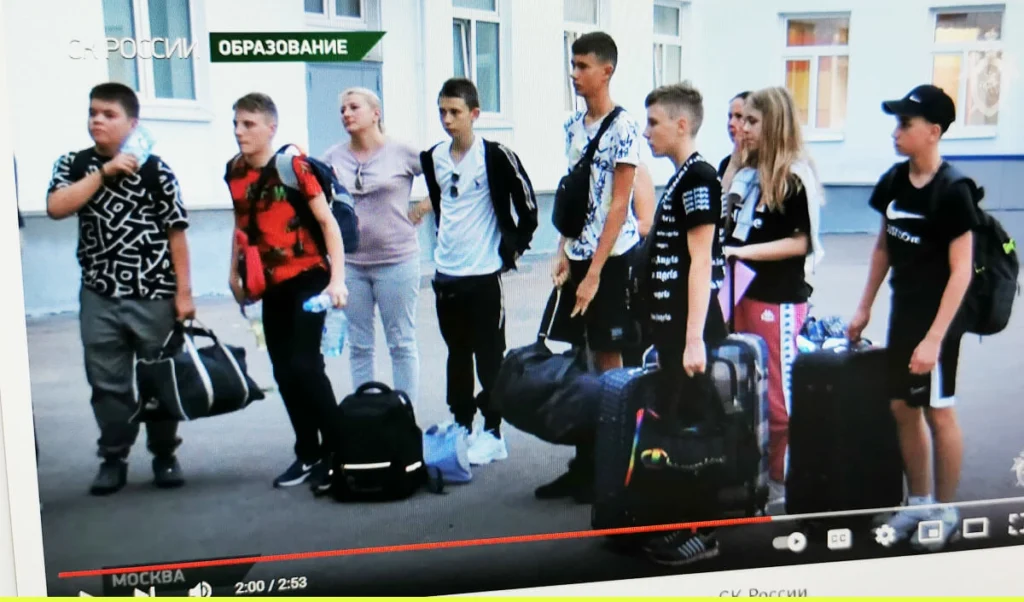
By August, the admissions decision came: Nikita and Denis had been matriculated. In late summer, the brothers joined other eighth- and ninth-graders from the Donetsk region who had all been admitted to Russian military academies. All of them had the required entrance exams waived. When the bus packed with kids reached Russia’s Rostov region, the group was split in two: some of them were put on another bus headed to Volgograd; others flew to Moscow aboard a military plane.
Several months later, Denis posted a photo of himself receiving a Russian passport from the Investigative Committee’s head Alexander Bastrykin. His brother Nikita posted a similar status, declaring his new allegiance: “Russia is now my life,” he wrote.
Always with you
“The children of Donbas” (a painful phrase, since 2014, that quickly became a cliché of Russian pro-war propaganda) drew the interest of Russia’s Investigative Committee (IC) from the very start of the armed conflict in the region. The federal agency promptly started recruiting students from the conflict zone for one of its boarding schools, based in the urban development of Khimki, just outside of Moscow. The IC’s recruiters focused on the socially disadvantaged youths. At the same time, the agency boasted about sending children wounded in the conflict to Moscow, for treatment at Dr. Leonid Roshal’s well-known emergency children’s clinic.
With the beginning of the full-scale invasion, federal agents started visiting displaced Ukrainian children in Russian orphanages, bringing them gifts and “humanitarian aid.” These visits occurred in at least 10 different Russian regions, as calculated by Verstka together with the open-source project Kidmapping, which tracks the deportation of Ukrainian children to Russia on an interactive map.
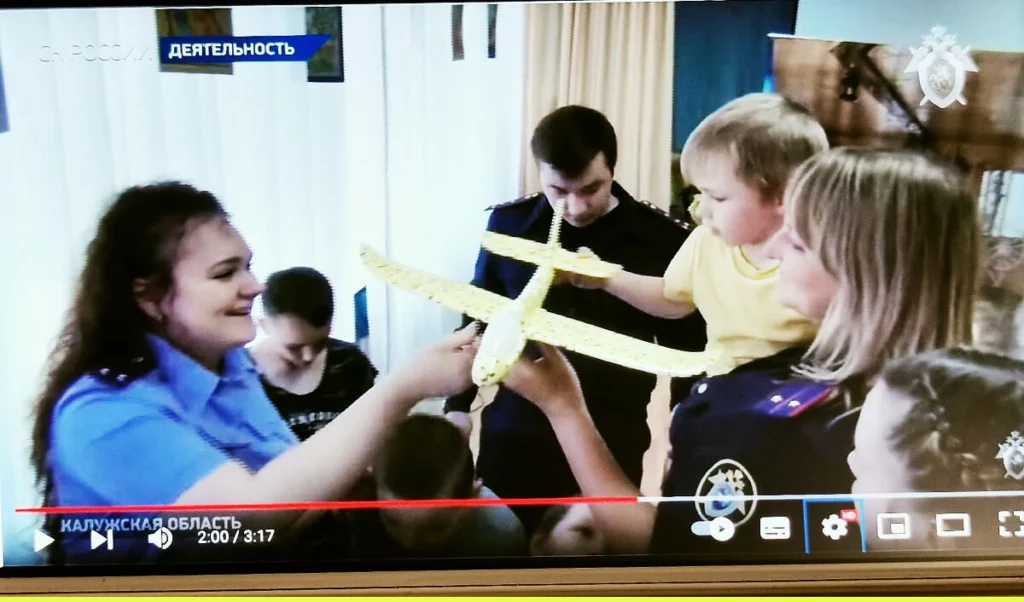
In the Kursk region, for example, the Investigative Committee sponsored a back-to-school drive for orphans from the Donetsk region. In Nizhny Novgorod, federal agents gave balls, jump-ropes, and table-tennis sets to “evacuated” children from Ukraine. Wounded children at Roshal clinic were visited by the agency’s chairman Alexander Bastrykin, who brought stuffed toys to give as gifts. When meeting with school-aged children, IC staff would mention their cadet corps and encourage them to apply.
The motto repeatedly invoked during these charitable visits, “no child is a stranger,” had been coined by Russia’s Children’s Rights Commissioner Maria Lvova-Belova, also famous for saying that “every child is our child.” It was also Lvova-Belova who thanked the IC and the federal agents for their help in “evacuating” Ukrainian children to Russia. This included Filipp, the teenage boy Lvova-Belova herself adopted upon meeting him in Russia. (According to Lvova-Belova, Filipp has since decided to apply to a law college, to work in the Russian justice system in the future.)
According to an internal report published by the Investigative Committee in its print journal, the agency had moved 323 children from Ukraine’s Donetsk, Luhansk, Kherson, and Zaporizhzhia regions across the Russian border. Only 181 of them were orphans. Upon entering Russia, 78 minors (28 of them orphaned) were enrolled in Russian schools, including military academies.
To mark International Children’s Day on June 1, 2022, the IC’s Bastrykin spoke before an audience of at-risk children, gathered for the occasion at the Bolshoi Theater in Moscow. Some of them had recently arrived from the Donbas. Speaking to the whole group, Bastrykin told the youngsters that Russia’s future, its “power,” and the state’s “future victories” were all in their hands. As if to assuage their anxiety, he added: “But the Investigative Committee is always with you. We’ll always lend you a hand.”
‘I learned the anthem in no time’
In September 2022, the Investigative Committee reported that 43 children from the Donbas had joined its cadet corps that school year. By watching the public exercises performed by IC cadets in Moscow, Volgograd, and St. Petersburg, Verstka identified 12 of the teenagers who had come to the cadet corps from the Russian-occupied Ukrainian territories.
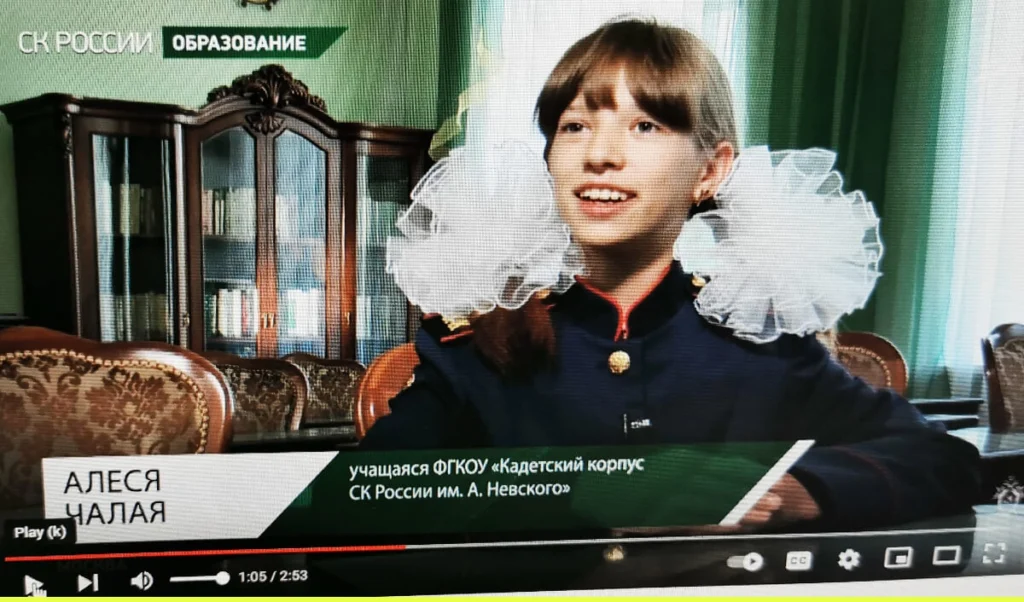
A teen who grew up in Makiivka and is now enrolled in the IC’s Moscow cadet corps, starts every morning by watching the Russian state flag being raised to the sound the national anthem. “At 7:00 a.m. every Monday, the whole corps has to sing the anthem,” he says. “To be honest, at first I didn’t even know the words. But I learned them in no time.” After losing both parents, this boy was raised by his grandfather in Makiivka, where his life revolved around soccer. The Russian cadet corps seemed like the best option for his future. He gave up soccer, and now attends classes six days a week, leaning Chinese and the fundamentals of jurisprudence.
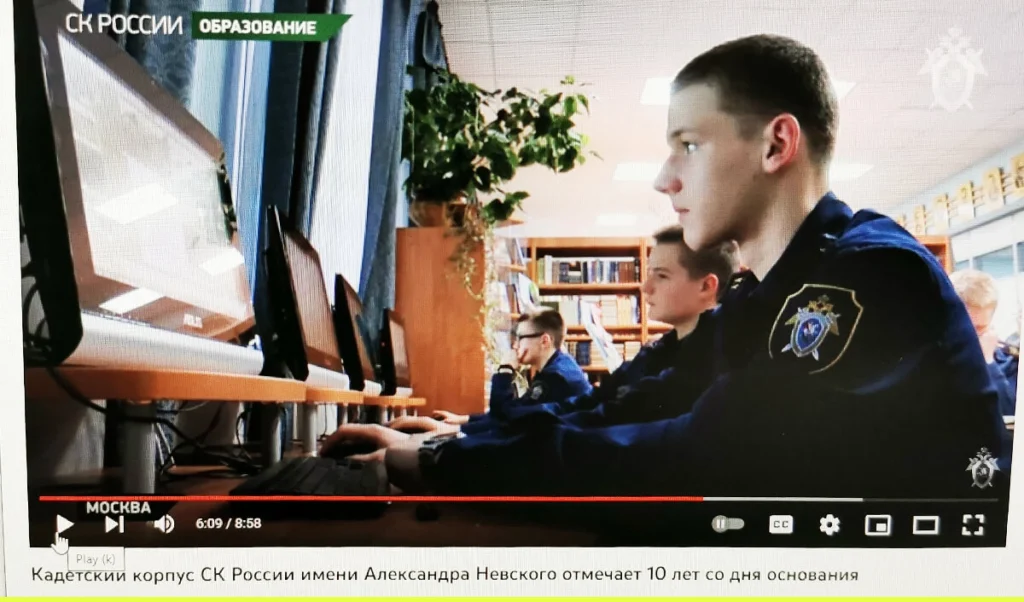
A ninth-grader from Donetsk joined a military academy in Volgograd under pressure from his mother. Because of all the shelling in their home city, she recalls, her son (the eldest of a large family) went to school remotely for a while. This made her anxious about the quality of the education he was getting. The boy wanted to become a pastry chef and resisted joining the cadet corps till the bitter end, she recalls. “He dug in his heels, but finally caved in under pressure. It’s the chance of a lifetime — you’ve got to try it, so that you don’t regret it for the rest of your life,” the woman told Verstka.
A 14-year-old from Shakhtarsk (also in the Donetsk region) was admitted mid-year. He says he still doesn’t understand why his classmates have to line up at the beginning of every class, “instead of just sitting down at their desks when the bell rings, like normal kids.”
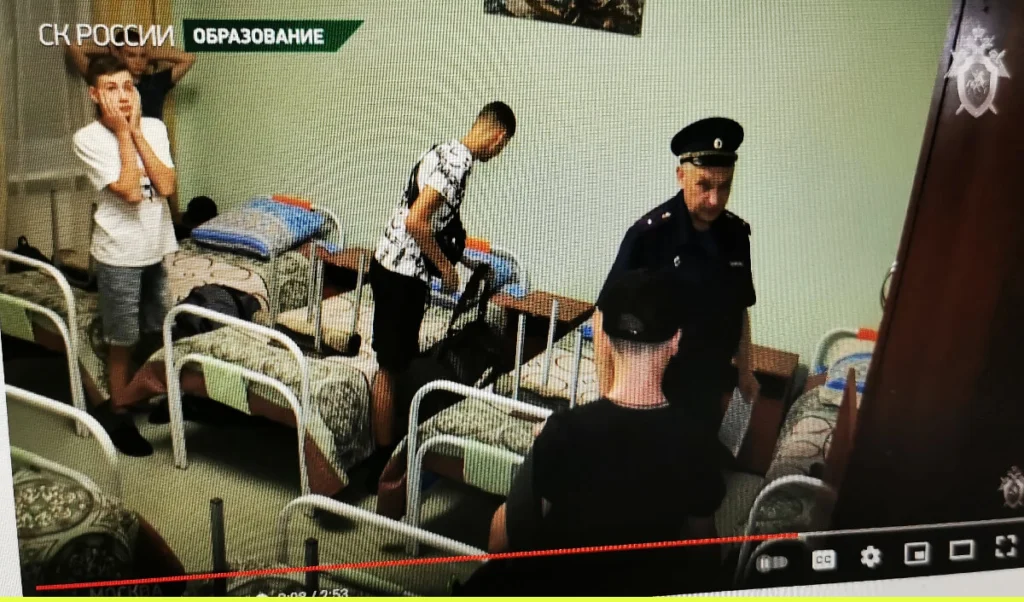
Nikita, one of the twins from Donetsk sent to the cadet corps by their grandmother, was at first intimidated by people “in epaulettes” all around him. “Everyone wearing insignia, and you don’t even know the rules yet.” He worried he might do something wrong and get in trouble. Until he enrolled at the academy, Nikita didn’t realize that most of the cadets there are expected to become detectives: “The FSB, the Prosecutor’s Office, and places like that. You can even become a judge, if I’m not mistaken,” he says.
Education and indoctrination
Sasha, a 14-year-old cadet from Horlivka, was admitted to the cadet corps together with his twin brother, just like the twins form Donetsk and another pair of siblings from Shakhtarsk. Sasha and his brother now live in Volgograd. Their school newspaper, Kadetsky Vestnik, has described them as survivors of “the aggression of the Kyiv regime.” When they still lived at home, a projectile exploded next to their home. The paper celebrated the fact that they were now studying “the basics of military service.”
In conversation with Verstka, Sasha said that he’s learned to take apart a machine gun and to put it back together. In May 2023, the twins were promoted to senior cadets for their achievements. This was the high point of their school year.
The values outlined in the IC cadet corps’s charter include “allegiance to the Russian Federation” and “respect for public service.” The schools’ curricula also describe the kind of person that every cadet should aspire to be: children are not only expected to be moral and creative, but also to “embrace the fate of their fatherland as their own.” This fatherland is presumed to be Russia, since the students are also expected to root themselves “in the spiritual and cultural traditions of the Russian people.” Ukrainians in the cadet corps are treated and expected to behave as Russians, without any special distinctions.

Extracurriculars at the boarding schools also revolve around Russia’s various wars throughout history. Since 2022, talks about the “special military operation” (Russia’s official euphemism for the full-scale invasion of Ukraine) have been added to the standard repertoire of lectures about World War II (called, incidentally, the Great Patriotic War in Russia) and the more recent Chechen and Afghan wars.
In February 2023, the cadets took part in a conference on the antifascist youth movement. According to the conference report, the participants learned the importance of “resisting attempts to falsify history.” The following month, cadets in Volgograd collected toiletries, food, and clothes for the Russian troops fighting in Ukraine. They also wrote letters to the front.
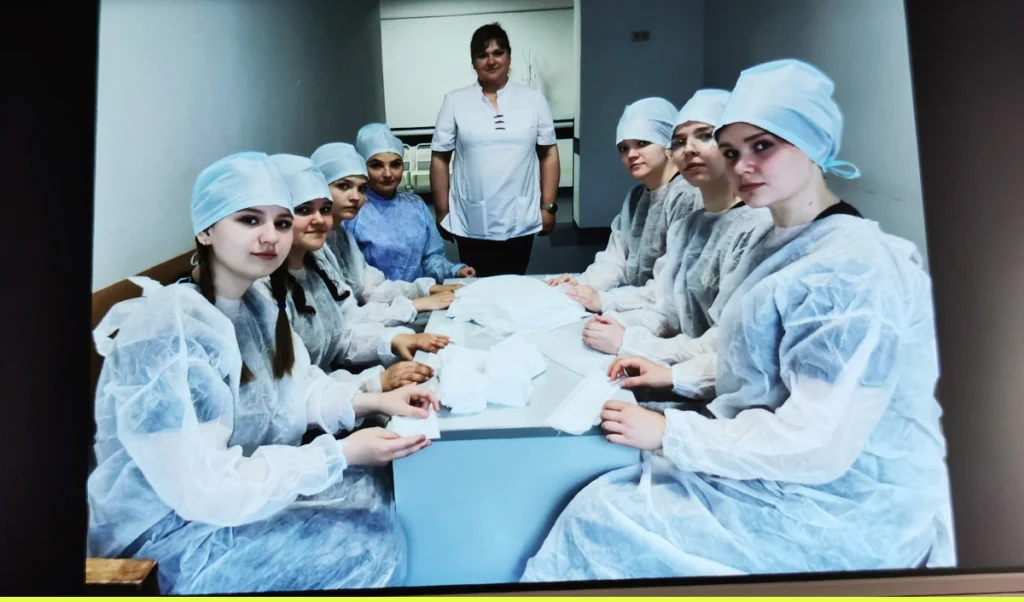
For the international law attorney Olga Gnezdilova, these extracurriculars amount to the indoctrination of the cadets in violation of the international Convention on the Rights of the Child, with which Russia is still obliged to comply. “Article 29 of the convention,” Gnezdilova says, makes clear that the education of a child should be about instilling respect for his or her parents, cultural identity, language, and home country. No matter how the [Russian] state might wish to help Donbas’s children adapt to new realities, it has a duty to respect their country of origin. Activities in support of people engaged in combat against Ukraine are clearly a violation of this principle. Children removed from the Donbas still have a connection to Ukraine, at least through their relatives and childhood memories. What we see here is clearly an attempt to re-educate them.
Another principle violated by educating Ukrainian cadets in Russia is what the Convention on the Rights of the Child describes as “the preparation of the child for responsible life in a free society, in the spirit of understanding, peace, tolerance, equality of sexes, and friendship among all peoples, ethnic, national and religious groups, and persons of indigenous origin.” Gnezdilova thinks that this rule is also undermined at the military schools where Russia’s “special military operation” in Ukraine is routinely glorified, both in classes and during extracurriculars.
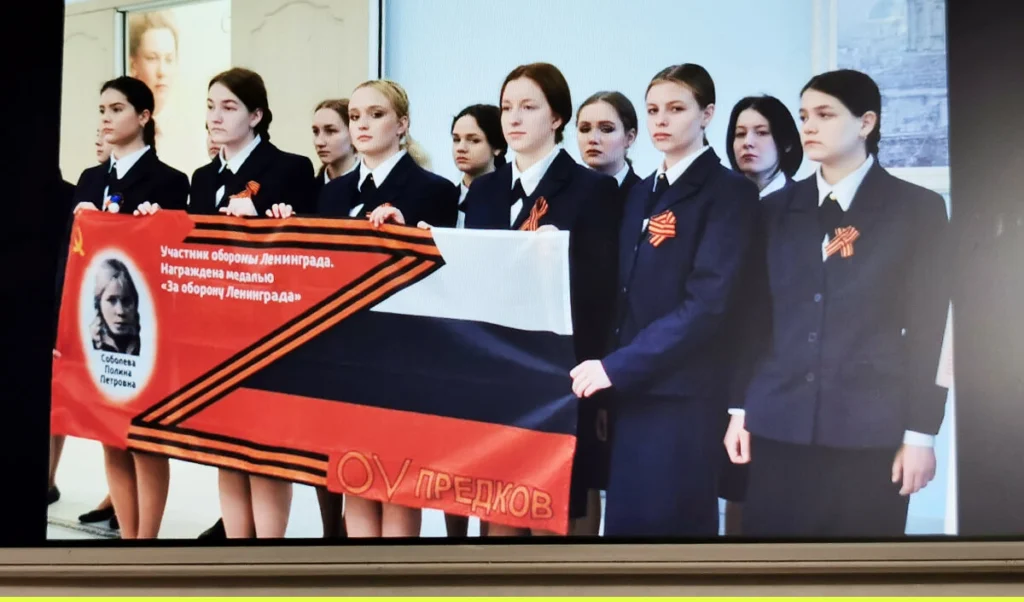
The parents’ and guardians’ consent, the Russian lawyer explains, doesn’t make the situation any less illegal or unethical:
Both Russian and international law work in the interests of the child. Is it in the child’s interest, then, to be embroiled in intensive ideological conflict? But he is inevitably exposed to this conflict when someone tells him that it’s fine to be fighting against the people in his country of origin. In his dependent position away from home, away from his parents, in a foreign country, he has to agree with whatever the cadet corps imposes on him. Indoctrination through the education system is a powerful instrument, and it really does work. The younger the child, the easier it is to maker her or him absorb ideological principles. The state is clearly taking advantage of this.
Subscribe to Verstka’s Telegram channel so that you do not miss our new publications
Without grandma
All the cadets who spoke to Verstka about their experience of leaving the Donbas to study in Russia mentioned that the hardest part of getting used to things was homesickness. Although some students in the cadet corps are orphaned, it’s still the norm for students to spend their weekly leave at home with family.
Cadets from the Donetsk region at the Moscow military academy said their school makes an effort to entertain them on weekends. Excursions and museum trips are sometimes organized by the staff. Students from the Donbas are also permitted to use smartphones, while the other cadets can only use push-button phones. “This is because they can see their families while on leave, but we only have video calls,” says a student from Shakhtarsk.
A student from Makiivka said that the cadets only get 15 minutes for daily phone-calls during the week. “The first month was especially tough. I’d feel homesick but had no time to call. Every night at bedtime, you’d think how much you just want to go home already,” he recalls.
Many of the students could only see their families during the school breaks, when chaperones took the cadets from the Donbas back to their home region. Some families came to visit their children in Moscow. The student from Makiivka who gave up soccer to become a cadet says that his grandfather came to visit him last May, at the end of the 2022–2023 school year. The two of them stayed in a rented apartment not far from the school. They took walks and went to soccer games together.
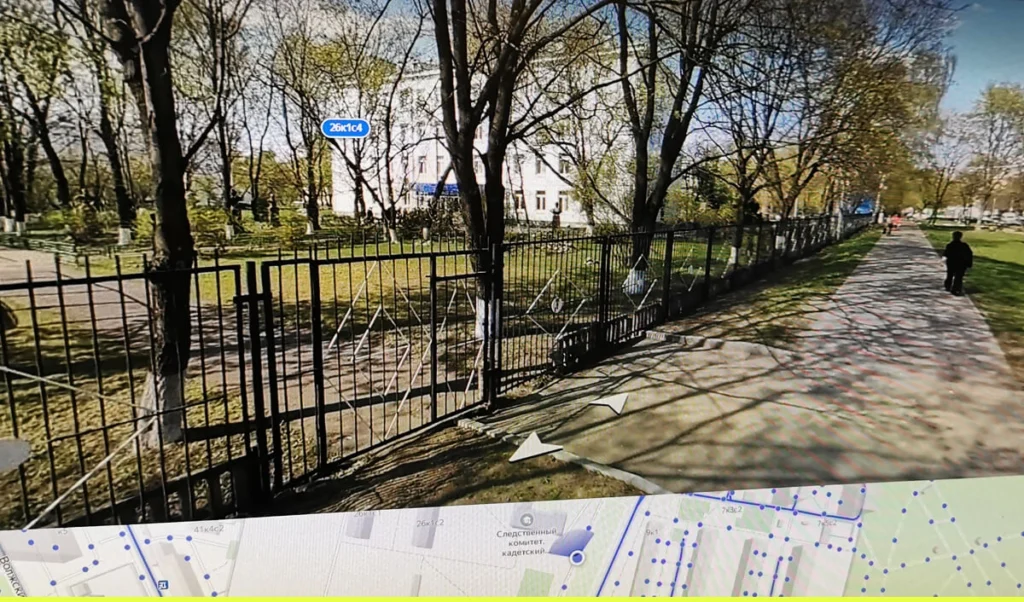
The twins Nikita and Denis also expected to spend the winter break with their grandmother. She decided to come and see them in December 2022, and to stay through the holidays. Although the twins missed her a lot, Nikita says, both he and his brother knew that she was immensely proud of them and boasted about them whenever anyone back in Donetsk asked about the boys.
The day before their grandmother’s arrival, a classmate’s mother helped the twins rent her an apartment. It was on the 31st floor of a high-rise, and getting there required multiple transfers on the Moscow subway. But somehow the family found there way there and spent an evening together. They were extremely happy, Nikita recalls.
Then the boys’ grandmother went to sleep — never to wake up again. “Grandma died on the very first day of vacation. I guess she didn’t survive the long journey. She hadn’t been used to traveling that far,” Nikita says.
The boy struggled to describe the rest of the vacation. He recalls their commander coming to see them on his own day off and telling them to “be strong.” The boys themselves had to pay for their grandmother’s cremation, and took the money out of their stipends. Then their classmate’s mother, the same woman who had helped them find an apartment, took their grandmother’s ashes back to Donetsk.
“It was really sad to be at the cadet corps over the New Year’s break. The place was empty. It felt like we were completely alone there. But our classmate and his family helped us. They took us to Red Square for the first time. We also went to a skating rink. Only without grandma,” Nikita says.
Last spring, the brothers went back to Donetsk, where the first thing they did was visit their grandmother’s grave. Their uncle has stepped in as their new legal guardian.
Influential friends
Nikita, who lost his grandmother during his first year as a cadet, shares the story of a “friendship” that started between him and his chaperone during his first trip from Donetsk to Moscow. It began somewhat awkwardly for Nikita when he counted up the stars on his chaperone’s epaulettes and guessed he must be a sergeant. The officer laughed at his mistake: “Can’t you see I’m a colonel,” he said good-humoredly.
The officer, whom Nikita calls “Dmitry Borisovich,” is now regularly in touch with him and his brother. Although the officer doesn’t work at the cadet corps, he’s taken the twins under his wing. Once, he scheduled the brothers for a physical at the Russian Children’s Clinical Hospital, without any warning to the boys. It turned out that Nikita had a deformed septum, while his brother was partially deaf in one ear. “Dmitry Borisovich just noticed that I was using nose drops a lot,” Nikita says, “and that my brother was always turning his good ear to hear better.”
When asked if he doesn’t think it strange to be friends with such a high-ranking officer, Nikita assures Verstka: “You’re wrong to think anything. This is definitely friendship, real friendship.” At the time of the interview, Nikita was looking forward to a vacation in the Crimea, also promised by Dmitry Borisovich. Several photos showing the cadet with his arm around an adult man have since appeared on Nikita’s VK page. Verstka studied them closely and identified the adult in the photos as Colonel Dmitry Gorbunkov, presently the head of the IC’s foreign relations department.
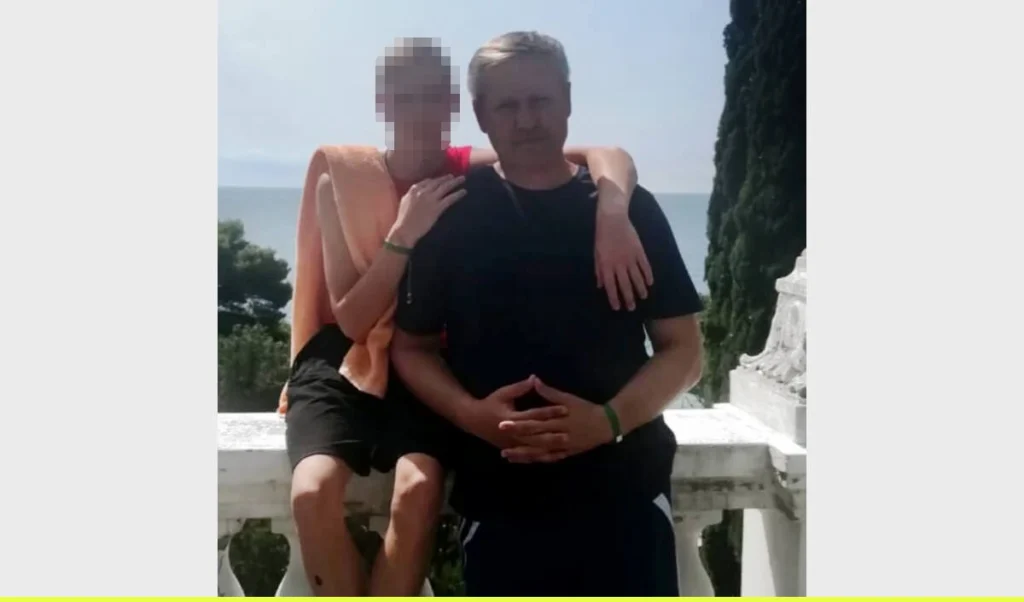
When contacted by Verstka, Gorbunkov declined to comment on his role in the youths’ lives. “But thank you for your interest in the life of our cadets,” he said.
A year into their acquaintance, Nikita insists that he and Gorbunkov talk to each other as openly as any next-of-kin. At the same time, he cannot answer any questions about Gorbunkov’s personal life. He doesn’t even know whether his “friend” has a family.
Another cadet, who originally came from Shakhtarsk, says that he finally felt “at home” in Russia when he stayed at the camp called “The Day After Tomorrow” (established by the Children’s Rights Commissioner Maria Lvova-Belova to help traumatized children from the Donbas). Cadets from the same region were sent there during a regular camp session, mingling with the “civilian” children. Because “there was no schedule and everything was really comfortable,” the cadet recalls, he was finally able to relax.
Recalling the same trip, another adolescent mentions a visit from the Investigative Committee’s chairman, General Alexander Bastrykin. Several cadets confirm that Bastrykin spent the whole day at the camp, drinking tea with the cadets, chatting, and posing for group photos by the press wall. When one of the boys asked for an autograph, the general scrawled: “Wishing you success in our shared country — Russia.” Bastrykin also swam in the pool and went to the sauna with the cadets. “It was unforgettable,” says one of them, adding that Bastrykin made a formidable impression on him.
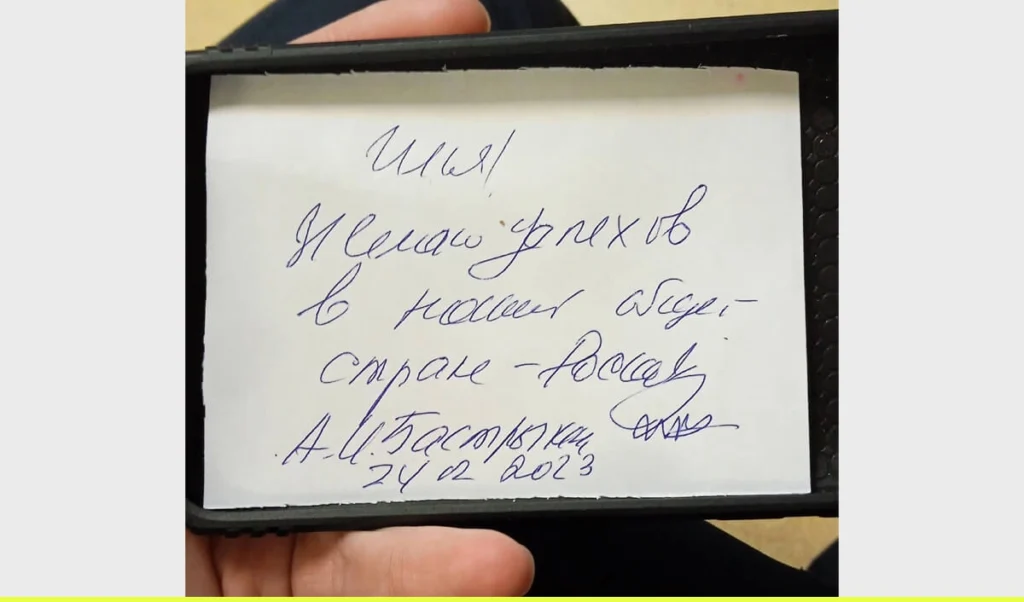
Nikita, who got sick and didn’t go to the camp, regrets having missed out. “Swimming pool and sauna — to me, it’s sheer luxury, and such prestige! I’ve never been to a pool or a sauna, except once, when visiting Dmitry Borisovich. He has his own sauna. It was so pleasant, I can’t even describe the feeling.”
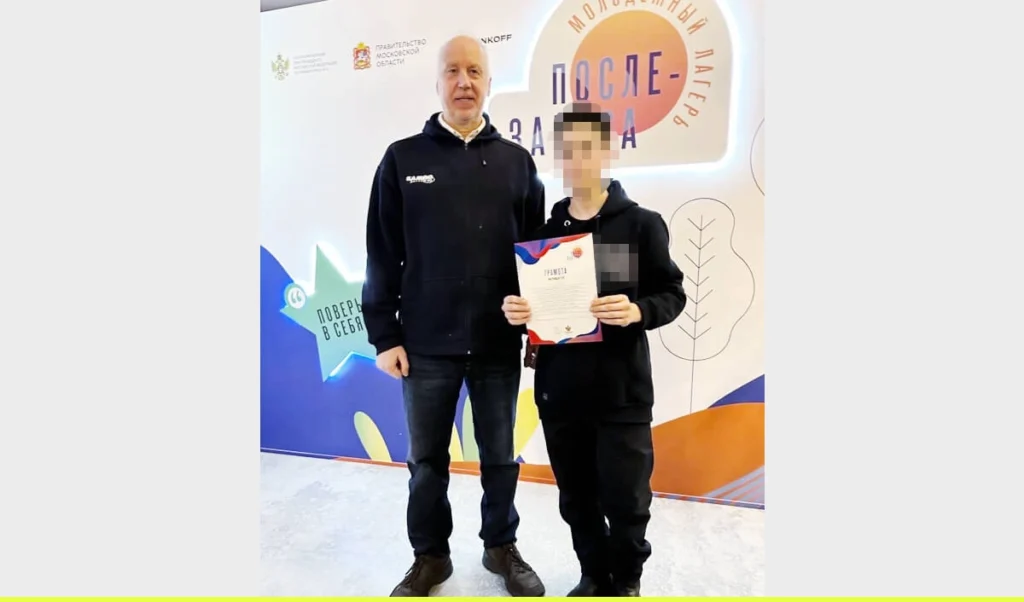
‘Rough around the edges and completely guileless’
When meeting with the cadets, one of the teens recalls, Bastrykin told them not to worry too much about their grades. “You can make mistakes,” the general said, “you can be less smart that someone else, but what matters is how steadfastly you go after your goal.”
The Investigative Committee also appears to be pursuing a goal: namely, to increase the percentage of cadets who enroll, upon leaving the cadet corps, at the IC Academy, the agency’s own college that trains the IC’s federal detectives. In 2017, only six former cadets matriculated at the academy, but by 2022 that number had increased to 94. One of the incentives to enroll is that cadets get extra points on the academy’s entrance exams, which vastly improves their admission chances. In 2022, Bastrykin said that 100 percent of that year’s graduating class accepted jobs as IC detectives as soon as they left the academy.
In 2020, the IC reached a formal partnership agreement with the Russian-backed government of the self-proclaimed Donetsk “republic.” That year, 10 teenagers from the region enrolled in the agency’s cadet corps. One of them was a tenth-grade student named Margarita. In order to get in, she had to take entrance exams in history, social science, physical education, and basic military training. When, after graduating from the cadet corps, she applied the the IC Academy, the selection process was tough once again. The faculty at the cadet corps, however, urged the cadets to stay within the IC system, instead of “slipping into” the Interior Ministry or FSB structures.
Margarita says that she and her classmates from Donetsk “wondered for a long time” why the IC was so heavily invested in recruiting them and turning them into full-fledged detectives. She still doesn’t have a clear answer to this question. “Maybe, they just got an order from the top to help our children,” she guesses.
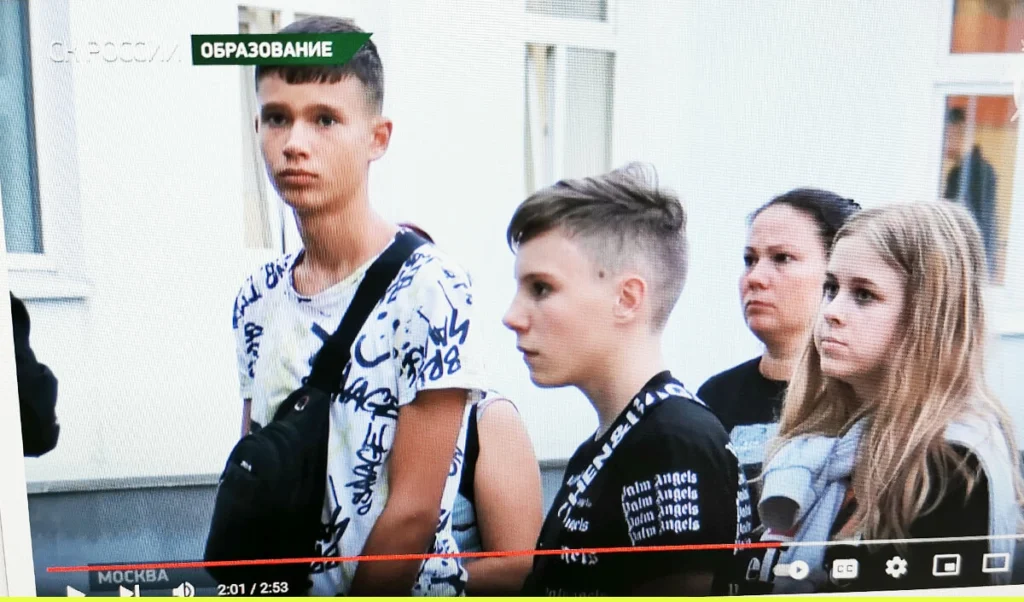
A source with knowledge of Russia’s law-enforcement system says that the IC chairman Bastrykin has several “bees in his bonnet,” one of them being juvenile justice and crimes against children. The speaker says that Bastrykin’s interests usually spring directly from his personal experiences. In the same way, he says, his interest in juvenile justice became apparent after his second marriage, when Bastrykin and his wife Olga Alexandrova (now dean of the Russian Law Academy) started having children.
Trying to understand the cadets’ own motives for trying to become detectives in the Russian justice system, Verstka wrote to one of the faculty members at the IC cadet corps, asking him to describe cadets from the Donbas. “To make it short,” he wrote back, “they’re kids like other kids. Some perform better than others, some get Bs and others Cs. Their main goal is to get into the IC Academy. Not all of them achieve this, but the motivation is there.”

Another faculty member described the same group of students as “good kids, a bit rough around the edges, and completely guileless.” Both faculty members declined to say more without approval from the school’s leadership.
The cadets themselves speak about their future as detectives in vague and general terms. The international law attorney Olga Gnezdilova thinks that neither the students nor their families may know much about the way this profession has changed over the past 20 years. Families who send their children to study in Russia from a region like the Donbas may know even less about what it’s like to work for the Russian law-enforcement system.
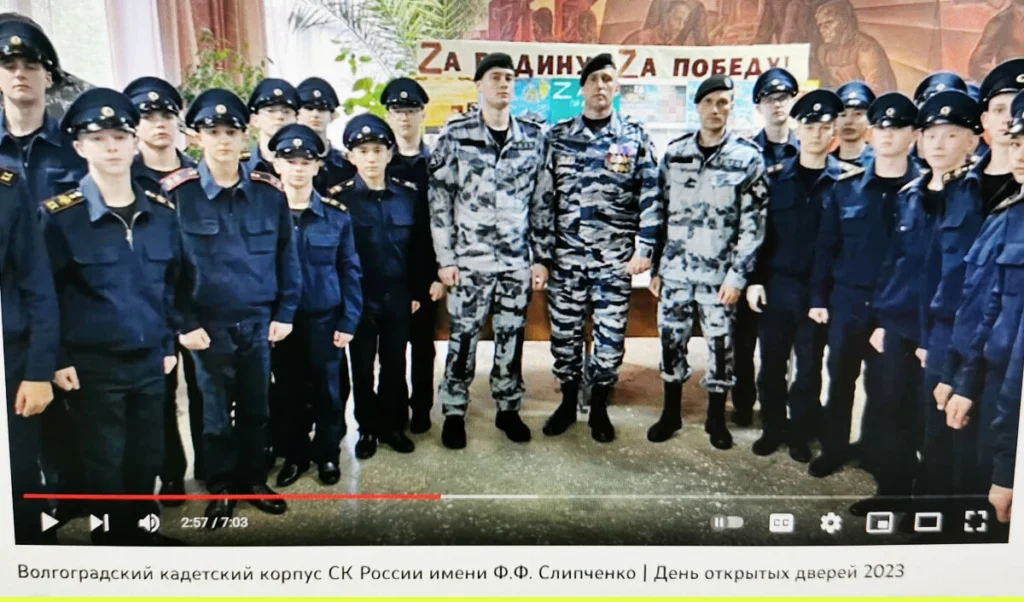
“In the early aughts,” she says, a detective’s education was supposed to turn him into a kind of Sherlock Holmes, but today solving crimes isn’t much of an interesting or subtle art. We see the IC ignoring the really complex cases, while elderly retired people get prosecuted for writing what they think about the war on their social media.
Gnezdilova believes that the IC’s cadets who came from the Donbas are being trained in order to be sent back to the region later, since they already know it so well. By the time they go back, she says, “they will have developed a loyalty [to Russia] and corresponding political views.”
Starting this fall, the IC is planning to open cadet classes in two schools located on occupied Ukrainian territories, in Luhansk and Skadovsk (a city in the Kherson region). The principals of the two schools each signed an agreement with the IC’s director for education and pedagogy, Sergey Petrov.
Cover: Elle
Adapted for Meduza in English by Anna Razumnaya
Поддержать «Вёрстку» можно из любой страны мира — это всё ещё безопасно и очень важно. Нам очень нужна ваша поддержка сейчас
